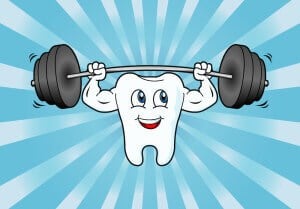
Three things you need to know about dental fillings: You’re stronger than you realize. When you chew, your back molars are exerting a force of roughly 70 pounds a square inch. That’s something to think about next time you eat dinner—or accidentally bite your tongue. Now imagine all that force, every day, exerted on your teeth and, in turn, your fillings. It’s no wonder that fillings eventually crack and need to be replaced! What may surprise you is that how long your fillings last can vary depending upon the type of material the dentist uses. Fillings enable you to a keep a tooth that otherwise might have been destroyed by tooth decay. When you have a cavity, the dentist clears the area of bacteria, using a drill to shape the tooth to ensure there is no decay left. He or she then fills the tooth with a specialized material. Fillings protect the soft, inner part of the tooth from infection. Because of their important role in oral health, it’s important to know the following three things about fillings:
1. Eventually, all fillings need to be replaced.
Do you grind your teeth while you sleep? If so, you may be exerting even more force on your teeth than the 70 pounds per square inch mentioned in the example above. Because of the extensive wear and tear your teeth undergo every day, eventually, all fillings will need to be replaced. How long do they last? That depends on the type of filling and how well you take care of your teeth. In general, fillings can last from seven to 15 years. There are several different types of fillings, but two of the most common are:
- Amalgam fillings: These are made from a metallic mixture of copper, silver and tin. They tend to be very durable and relatively inexpensive.
- Composite fillings: These fillings are made of acrylic resin and tiny, finely ground glass-like particles. Combined, these materials create a tooth-colored filling. These are often used to repair smaller cavities, particularly if located on one of the front teeth.
The material your dentist uses depends upon the location and size of the cavity, as well as other factors. Speak with your dentist about what type of material is being used and what you can expect.
2. A damaged or cracked filling should be fixed as soon as possible.
Even microscopic, hairline cracks in your filling can allow bacteria and germs to silently creep in and set up shop. It’s impossible to remove this bacteria by brushing and flossing. This means that it is possible to have tooth decay underneath a filling! Therefore, if you believe you may have a cracked or loose filling, it’s important to immediately schedule an appointment with your dentist. Symptoms of a cracked filling include a sharp pain when biting on hard food or an intense sensitivity to heat or cold. If the filling isn’t fixed in a timely manner, the bacteria can damage the soft inner part of the tooth called the pulp. If the pulp is infected, a root canal may be needed.
3. Fillings aren’t a “safety net” or a “seal” for your teeth.
Modern dentistry is wonderful isn’t it? After all, if you had been born 100 years ago, your options for treating cavities would be extremely limited (often removal was the only option). But just because you do have access to the latest dental technology and tooth colored fillings doesn’t mean you should slack off on good dental hygiene. Even the most sophisticated fillings are just that—fillings. There’s no substitute for your natural teeth. This means it’s important not only to brush your teeth, but also to brush them correctly. Your teeth are still susceptible to decay or breakdown. The easiest way to avoid fillings is to follow good dental hygiene practices and, most important, have regular dental checkups. Regular dental X-rays will help the dentist discover any cracks or problems with your fillings. Remember: don’t delay if you need to have a cavity filled. When your dentist tells you that you have a cavity, your first reaction may be to groan—no one wants to go through the time and expense of having dental work. Instead of dreading the procedure, see this as an opportunity to speak with your dentist about what steps you can take to improve your oral health. Always remember that regular checkups enable your dentist to prevent many problems before they can develop. Ask questions and become an active partner in your care. Dental Express offers dental care for the entire family, including SmileCorrect, implants, emergency dental care and maintenance services. Our practice features compassionate care coupled with state-of-the-art dentistry at four convenient locations in San Diego: Downtown, Point Loma, Clairemont and Santee. Contact us to schedule an appointment today.

